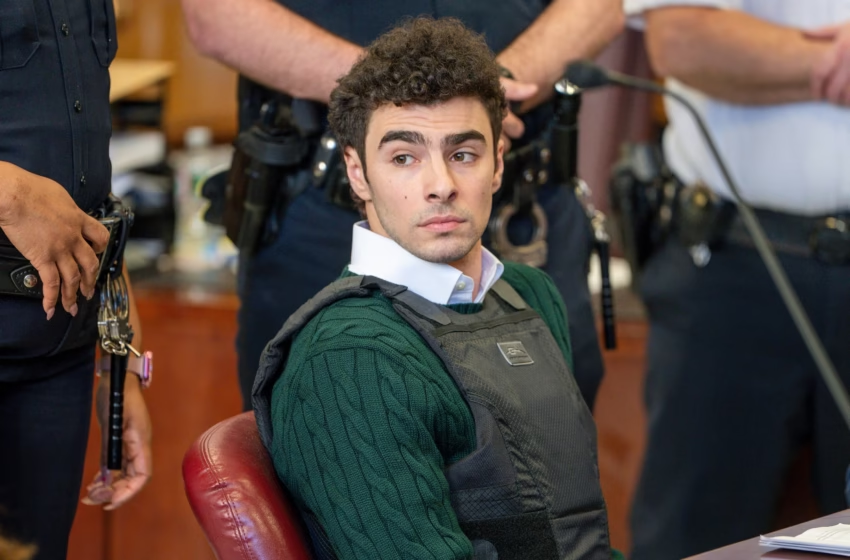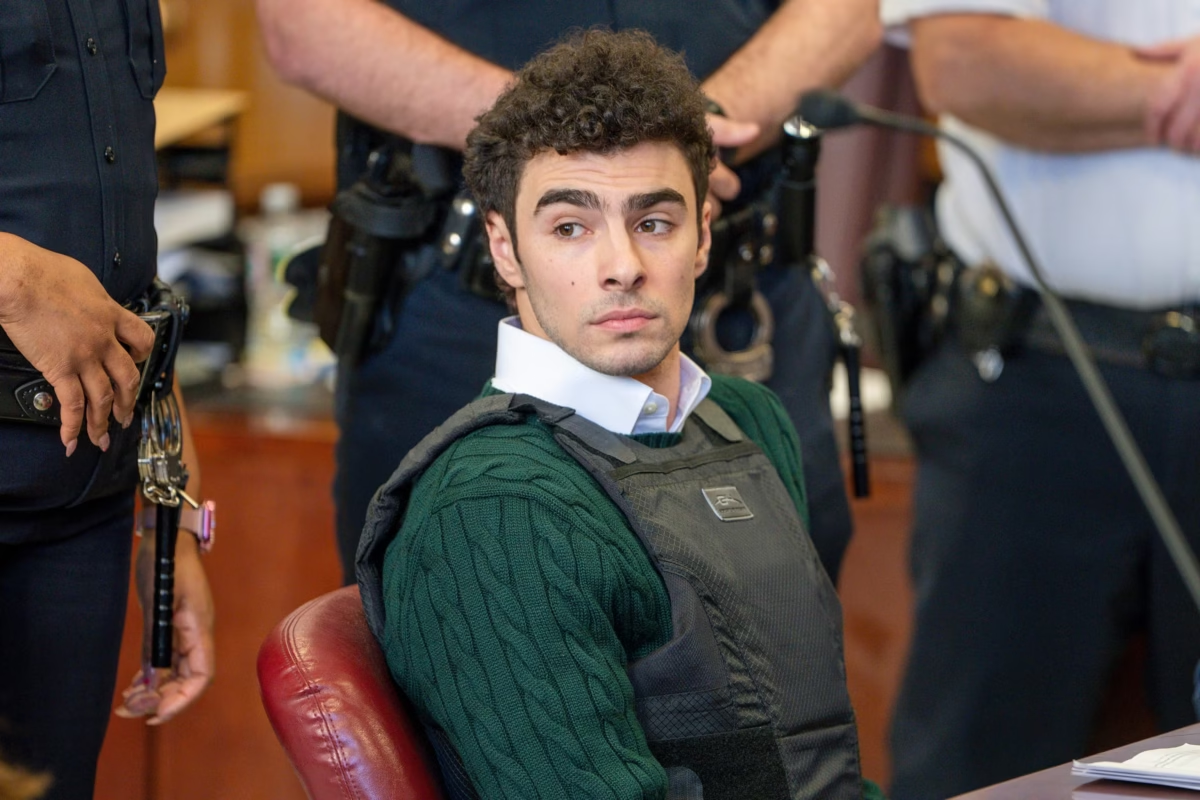Luigi Mangione Terrorism Charges Dismissed in Brian Thompson Murder Case: Here’s what to know

Luigi Mangione, accused of fatally shooting the UnitedHealthcare CEO Brian Thompson in New York City and leading authorities on a five-day search, appears in court for a hearing, Feb. 21, 2025, in New York. Image Credit: Steven Hirsch/Pool via AP, Files
A Manhattan judge has dismissed state terrorism charges against Luigi Mangione, the 27-year-old accused of fatally shooting UnitedHealthcare CEO Brian Thompson in December 2024. The ruling removes two of the most severe counts from the high-profile case, though Mangione still faces second-degree murder and multiple weapons charges that could carry a sentence of 25 years to life if convicted.
Why Were Luigi Mangione’s Terrorism Charges Dropped?
Judge Gregory Carro ruled on Tuesday that the terrorism counts, first-degree murder in furtherance of terrorism and second-degree murder as a crime of terrorism, were “legally insufficient.” Prosecutors had argued Mangione intended to use the killing to send a violent political message, describing the attack in Midtown Manhattan as a spectacle meant to intimidate.
But Judge Carro disagreed, writing that there was no evidence Mangione acted to “terrorize the public, inspire widespread fear, or conspire with organized terrorist groups.” Instead, the judge described the crime as “heinous but targeted,” noting that it did not meet New York’s legal threshold for terrorism.
What Charges Does Luigi Mangione Still Face?
Despite the dismissal, Mangione remains charged with second-degree murder and eight weapons-related counts in New York state court. He also faces federal charges, including those that could lead to the death penalty, and separate proceedings in Pennsylvania where he was arrested.
The Manhattan District Attorney’s office, led by Alvin Bragg, said in a statement: “We respect the Court’s decision and will proceed on the remaining nine counts, including Murder in the Second Degree.”
Mangione has pleaded not guilty to all charges. His attorneys continue to challenge the legality of key evidence, including a gun and notebook seized from his backpack, claiming it was obtained without a warrant.
READ ALSO
Luigi Mangione ordered to appear in Pennsylvania Court: What to know
A Case That Sparked National Debate
The killing of Brian Thompson, a husband and father of two, drew widespread attention not only for its brutality but also because of Mangione’s growing support base. His court appearances have drawn large crowds, with supporters chanting outside Manhattan Supreme Court and raising funds for his legal defense.
His case also plays into a broader conversation about political violence in the U.S., coming amid a series of high-profile shootings, including two assassination attempts against President Donald Trump and the recent killing of activist Charlie Kirk.
What Happens Next in the Luigi Mangione Trial?
Hearings in Mangione’s case are scheduled to begin December 1, 2025, where the court will determine whether police statements and seized evidence can be admitted at trial. The proceedings will also decide if psychiatric testimony or an insanity defense will be part of his strategy.
While terrorism charges are now off the table, the remaining counts still pose serious legal risks for Mangione. If convicted of second-degree murder, he faces 25 years to life in prison under New York law.
For now, the case continues to unfold in parallel across state and federal courts, ensuring that Luigi Mangione’s name, and the controversy surrounding it, will remain in the spotlight well into 2026.
FAQ
Q1: Who is Luigi Mangione?
A1: Luigi Mangione is a 27-year-old man charged in connection with the December 2024 fatal shooting of UnitedHealthcare CEO Brian Thompson in Manhattan. He has attracted national attention because of the high-profile victim, multiple jurisdictions pursuing charges, and a vocal online support base. Mangione has pleaded not guilty to the allegations.
Q2: What charges did Luigi Mangione face in New York state court?
A2: In New York state court Mangione was originally indicted on 11 counts that included murder and two terrorism-related counts. After a pretrial hearing, a judge dismissed the two terrorism counts as legally insufficient. He still faces second-degree murder and multiple weapons-related charges in the state case.
Q3: Why were the terrorism charges against Luigi Mangione dismissed?
A3: Manhattan Supreme Court Justice Gregory Carro ruled the terrorism counts “legally insufficient,” concluding prosecutors had not shown Mangione intended to terrorize the public, inspire widespread fear, influence government policy, or conspire with organized terrorist groups. The judge characterized the killing as a targeted, discrete act rather than an act that met New York’s legal definition of terrorism.
Q4: Does Luigi Mangione still face other criminal charges?
A4: Yes. After the terrorism counts were dropped, Mangione continues to face second-degree murder and several weapons-related counts in state court. In addition to the state case, federal prosecutors have brought charges that could include capital-eligible counts, and he also faces charges in Pennsylvania related to his arrest.
Q5: Could Luigi Mangione face the death penalty?
A5: The death penalty is not available in New York state; however, Mangione faces separate federal charges for which prosecutors have signaled they may seek the death penalty. Any death-penalty decision would be part of the federal case and subject to federal prosecutorial discretion and court procedures.
Q6: What did the Manhattan District Attorney say after the dismissal?
A6: The Manhattan District Attorney’s Office (led by Alvin L. Bragg) said it respected the court’s decision and would proceed on the remaining state counts, including second-degree murder. Prosecutors indicated they will continue to litigate the case aggressively and pursue admissibility of evidence and statements.
Q7: When is the next court date or hearing in the case?
A7: As reported at the September 16, 2025 hearing, judges scheduled pretrial hearings to begin December 1, 2025. Those hearings will address evidentiary motions, including suppression challenges to statements and physical evidence and whether psychiatric testimony may be introduced.
Q8: What evidence did police seize in the case?
A8: Authorities recovered items including a gun and a notebook from a backpack connected to Mangione. His lawyers have moved to suppress some of that evidence, arguing it was obtained without a lawful search warrant. The court had not ruled on suppression motions as of the last hearing.
Q9: Did Mangione’s lawyers seek to dismiss the state case on double jeopardy grounds?
A9: Defense attorneys argued that parallel state and federal prosecutions raised double-jeopardy concerns and asked the state charges be dismissed. Judge Carro rejected that request in the state hearing, allowing the state prosecution to proceed on the remaining counts.
Q10: Has Luigi Mangione entered a plea?
A10: Mangione has pleaded not guilty to the state charges. His legal team continues to file pretrial motions and defend against the allegations.
Q11: Who was the victim, Brian Thompson?
A11: Brian Thompson was the Chief Executive Officer of UnitedHealthcare and a husband and father of two. His December 2024 killing in Midtown Manhattan generated national media coverage and heightened scrutiny of the case.
Q12: Why has the case attracted public attention and supporters?
A12: The case drew intense attention because of the victim’s corporate profile, the circumstances of the killing, Mangione’s rapid rise to online notoriety, and the political and social debates around violence and healthcare that followed. Large crowds of supporters and online fundraising for Mangione’s defense were reported, raising controversy and national discussion.
Q13: How much money has been raised for Mangione’s legal defense?
A13: Media coverage reported significant online fundraising for Mangione’s defense. Reports indicated donations totaled roughly $1.5 million to support his legal costs, as of the September 16, 2025 coverage.
Q14: Where is Mangione being held?
A14: Reporting indicates Mangione is being detained in federal custody in Brooklyn pending federal proceedings while state charges proceed in Manhattan Supreme Court.
Q15: What are prosecutors’ theories about motive?
A15: Prosecutors at times argued the killing was intended to create a public spectacle and advance Mangione’s grievances about the healthcare system, framing it as an act to attract attention. The judge found that such assertions did not meet New York’s statutory standard for terrorism in the state counts.
Q16: How do state and federal charges interact in this case?
A16: Mangione faces parallel prosecutions, state charges in New York (including murder and weapons counts) and federal charges that may carry different penalties (including potential capital exposure). Parallel cases are legally complex; courts will resolve motions about admissibility, double-jeopardy claims, and procedural issues separately in each jurisdiction.
Q17: Could the state still seek enhanced sentences without terrorism counts?
A17: Yes. Although the terrorism counts were dismissed, the remaining state charges, particularly second-degree murder, carry severe penalties under New York law (which may include 25 years to life). Prosecutors can still seek maximum penalties if Mangione is convicted on the remaining counts.
Q18: Will psychiatric evidence or an insanity defense be raised?
A18: Prosecutors have asked the defense to state whether it intends to pursue an insanity defense or introduce psychiatric testimony. The court had not ruled on those issues at the September 16 hearing; such determinations will be addressed at upcoming pretrial proceedings.
Q19: Where can I find official updates on the Luigi Mangione case?
A19: Official updates come from court filings in Manhattan Supreme Court, press releases from the Manhattan District Attorney’s Office, and federal court dockets. Major news outlets (local and national) are also covering the proceedings as they develop.
Q20: How does this ruling affect the broader conversation about political violence?
A20: The dismissal of terrorism counts narrowed the legal framing of the crime but did not eliminate broader public concerns about lone-actor violence, online radicalization, and politically motivated attacks. The case remains a focal point in discussions about how prosecutors classify violent acts and when terrorism statutes apply.


